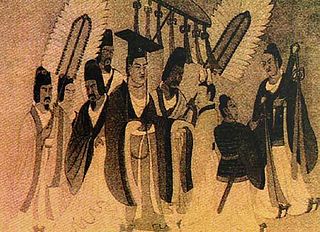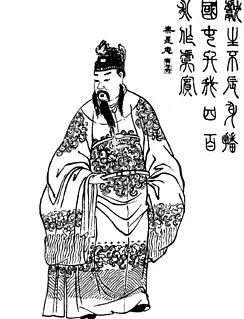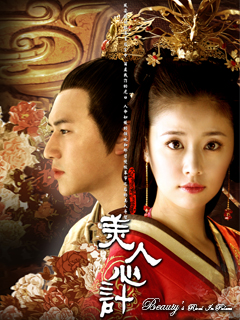Related Research Articles

Year 951 (CMLI) was a common year starting on Wednesday of the Julian calendar.

Emperor Xiaowen of Northern Wei ( 魏孝文帝), personal name né Tuoba Hong (拓拔宏), later Yuan Hong (元宏), or Toba Hung II, was an emperor of the Northern Wei from September 20, 471 to April 26, 499.
Empress (Dowager) Lü Zhi, commonly known as Empress Lü and formally Empress Gao of Han, was the empress consort of Gaozu, the founding emperor of the Han dynasty. They had two known children, Liu Ying and Princess Yuan of Lu. Lü was the first woman to assume the title Empress of China and paramount power. After Gaozu's death, she was honoured as Empress Dowager and Regent during the short reigns of Emperor Hui and his successors Emperor Qianshao of Han and Liu Hong.

Emperor Hui of Han was the second emperor of the Han Dynasty in China. He was the second son of the first Han emperor, Han Gaozu and the lady who after the death of her husband, became the Empress Dowager Lü. Lu was her last name, and she was from the powerful Lu clan. Han Huidi is generally remembered as a somewhat weak character dominated and terrorized by his mother, Lü. Huidi was personally kind and generous, but unable to escape the impact of Lu Hou's viciousness. However he did end the laws of Burning of books and burying of scholars. He tried to protect Ruyi, Prince Yin of Zhao, his younger half-brother, from being murdered by Empress Dowager Lü, but failed. After that, he indulged himself in drinking and sex, and died at a relatively young age. Emperor Hui's wife was Empress Zhang Yan, a niece of his by his sister Princess Yuan of Lu; their marriage was the result of insistence by Empress Dowager Lü and was a childless one. Empress Dowager Lü installed two of his alleged sons whom she adopted into her clan, Liu Gong and Liu Hong, the sons of the Emperor's concubine(s) after he died without a designated heir: however they and the rest of the Lu clan were exterminated and Han Wendi was established as emperor, as heir of the Liu clan, thus firmly establishing the succession of the Liu family as the dynastic family of Han.
Emperor Chong of Han was an emperor of the Chinese Han Dynasty and the eighth emperor of the Eastern Han period.

Emperor Xian of Han, personal name Liu Xie, courtesy name Bohe, was the 14th and last emperor of the Eastern Han dynasty in China. He reigned from 28 September 189 until 11 December 220.

Lady Gan was a concubine of Liu Bei, the founding emperor of the state of Shu Han in the Three Kingdoms period of China and Liu Shan's mother. She was later posthumously honoured as Empress Zhaolie.
Liang Na, formally Empress Shunlie, was an empress during the Han Dynasty. Her husband was Emperor Shun of Han. She later served as regent for his son Emperor Chong, and the two subsequent emperors from collateral lines, Emperor Zhi and Emperor Huan. As empress dowager and regent, she appeared to be diligent and honest, but she overly trusted her violent and corrupt brother Liang Ji, whose autocratic nature would eventually draw a coup d'etat from Emperor Huan after Empress Dowager Liang's death, leading to the destruction of the Liang clan.
Empress Dowager Dong, personal name unknown, formally known as Empress Xiaoren, was an empress dowager of the Eastern Han dynasty of China. She was never empress throughout her early life because she was the wife of a marquis; she only became empress dowager because her son, Liu Hong, became the emperor by chance. During her son's reign, she developed a rivalry with her daughter-in-law, Empress He, because she wanted Emperor Ling's younger son, Liu Xie, to be crown prince while Empress He wanted her own son, Liu Bian to succeed his father. Emperor Ling died in 189 before he managed to designate either of his two sons as crown prince. Liu Bian eventually took the throne as Emperor Shao; Empress Dowager Dong, as the emperor's grandmother, became grand empress dowager, while her daughter-in-law became empress dowager. Empress Dowager He eventually conspired with her brother, General-in-Chief He Jin, to unseat her mother-in-law from power. Grand Empress Dowager Dong died of illness shortly after her downfall; the common people held Empress Dowager He and her family responsible for the grand empress dowager's death.
Empress Wu, personal name unknown, formally known as Empress Mu, was an empress of the state of Shu Han during the Three Kingdoms period. She was the last wife and the only empress of Liu Bei, the founding emperor of Shu Han, and a younger sister of Wu Yi. Her father, whose name is not recorded in history, was a friend of Liu Yan, and followed Liu Yan to Yi Province when Liu Yan was made the governor. Because of the friendship between her father and Liu Yan, she was married to Liu Yan's son Liu Mao (劉瑁). After Liu Mao's death, she did not remarry for some time.

Beauty's Rival in Palace is a 2010 Chinese television series adapted from Xiao Qiying's short story Turbulence in the Empress' Chamber (未央沉浮). It was first broadcast on Shanghai TV Drama on 15 March 2010. The series was one of the highest-rated Chinese TV series in 2010.

The Patriot Yue Fei is a 2013 Chinese television series based on the life of Yue Fei, a Song dynasty general widely regarded as a patriot and national hero in Chinese culture for his role in the Jurchen campaigns against the Song dynasty. While the plot is based on historical sources, it also includes elements of fiction and draws ideas from the novel General Yue Fei (說岳全傳) and other folktales on the general's life.
Empress Liu, formally Empress Shenminjing, was the second wife and only empress of Emperor Zhuangzong of Later Tang, the founding emperor of the Chinese Five Dynasties and Ten Kingdoms period state Later Tang. In traditional histories, she was regarded as a hoarder of wealth who, during her husband's reign, became extremely powerful, with her own orders carrying the same weight as his own. It was the killing of the major general Guo Chongtao by at her order in 926 that created a cascade of military rebellions that led to Emperor Zhuangzong's downfall and death; she was subsequently killed by his adoptive brother and successor Li Siyuan.
Empress Ma was the only known empress of the Chinese Five Dynasties and Ten Kingdoms period state Southern Han. She was the wife of Southern Han's founding emperor Liu Yan, and the daughter of Ma Yin, the prince of Southern Han's northern neighbor Chu.
Liu Hua, courtesy name Dexiu (德秀), formally Lady Minghui of Yan (燕國明惠夫人), known in Southern Han as Princess Qingyuan (清遠公主), was the first (known) wife of Wang Yanjun, who carried the title of Prince of Min during her lifetime and claimed the title of emperor. Her father was Liu Yin, the older brother of Southern Han's founding emperor Liu Yan.
Liu Min (劉旻), named Liu Chong (劉崇) before 951, also known by his temple name Shizu (世祖), was the founding emperor of imperial China's Northern Han state during the Five Dynasties and Ten Kingdoms period. He was an ethnic Shatuo and the younger brother of Later Han's founder Liu Zhiyuan.
Liu Yun, probably known as Liu Chengyun before 949, referred to in historical sources as the Duke of Xiangyin (湘陰公), was a military governor of the Later Han dynasty during the Five Dynasties period. He was an ethnic Shatuo.
Empress Li, known as Empress Dowager Zhaosheng (昭聖太后) during Later Zhou, was an empress of the Chinese Five Dynasties and Ten Kingdoms Period state Later Han. She was the wife of Later Han's founder Liu Zhiyuan and the mother of its second emperor Liu Chengyou. She served as regent n the interregnum of 951, after the death of her son until the installation of his successor.
Liu Jun (926–968) originally Liu Chengjun (劉承鈞), was the 2nd ruler of the Shatuo state of Northern Han. His capital was at Taiyuan, Shanxi Province. He was the 2nd son of Liu Chong, the 1st emperor of Northern Han. In 951, after the death of his brother Liu Yun, he became the heir of his father. During his reign, in 960, the Later Zhou dynasty was overthrown and replaced by the Song dynasty.
Murong Yanchao (慕容彥超), known as one point as Yan Kunlun (閻崑崙), was a general of the Chinese Five Dynasties and Ten Kingdoms states Later Tang, Later Jin, and Later Han. As a half-brother of Later Han's founder Liu Zhiyuan, he was particularly prominent during Later Han. After the Later Han throne was seized by the general Guo Wei, who founded Later Zhou, Murong initially submitted to Guo but then rebelled, but his rebellion was quickly suppressed, and he committed suicide.
References
| Regnal titles | ||
|---|---|---|
| Preceded by None (traditionally), claimed to be succeeding Empress Li of Later Han | Empress of Northern Han 951–954 | Succeeded by Empress Guo |
| Empress of China (Central Shanxi) 951-954 | ||